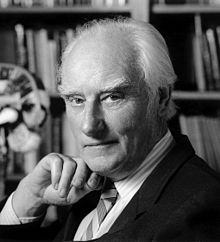
Back Francis Crick Afrikaans Francis Crick ALS فرنسيس كريك Arabic فرنسيس كريك ARZ Francis Crick AST Fransis Krik Azerbaijani فرانسیس کریک AZB Фрэнсіс Гары Крык Byelorussian Франсис Крик Bulgarian ফ্রান্সিস ক্রিক Bengali/Bangla
Francis Crick | |
|---|---|
 | |
| Born | Francis Harry Compton Crick 8 June 1916 Weston Favell, Northamptonshire, England |
| Died | 28 July 2004 (aged 88) San Diego, California, U.S. |
| Alma mater | |
| Occupations | |
| Known for | |
| Spouses | |
| Children | 3 |
| Awards |
|
| Scientific career | |
| Fields | |
| Institutions |
|
| Thesis | Polypeptides and proteins: X-ray studies (1954) |
| Doctoral advisor | Max Perutz[5] |
| Doctoral students | None[5] |
| Website | www |
| Signature | |
 | |
Francis Harry Compton Crick OM FRS[1][2] (8 June 1916 – 28 July 2004) was an English molecular biologist, biophysicist, and neuroscientist. He, James Watson, Rosalind Franklin, and Maurice Wilkins played crucial roles in deciphering the helical structure of the DNA molecule.
Crick and Watson's paper in Nature in 1953 laid the groundwork for understanding DNA structure and functions. Together with Maurice Wilkins, they were jointly awarded the 1962 Nobel Prize in Physiology or Medicine "for their discoveries concerning the molecular structure of nucleic acids and its significance for information transfer in living material".[5][6]
Crick was an important theoretical molecular biologist and played a crucial role in research related to revealing the helical structure of DNA. He is widely known for the use of the term "central dogma" to summarise the idea that once information is transferred from nucleic acids (DNA or RNA) to proteins, it cannot flow back to nucleic acids. In other words, the final step in the flow of information from nucleic acids to proteins is irreversible.[7]
During the remainder of his career, he held the post of J.W. Kieckhefer Distinguished Research Professor at the Salk Institute for Biological Studies in La Jolla, California. His later research centered on theoretical neurobiology and attempts to advance the scientific study of human consciousness. He remained in this post until his death; "he was editing a manuscript on his death bed, a scientist until the bitter end" according to Christof Koch.[8]
- ^ a b Anon (2015). "Fellowship of the Royal Society 1660–2015". London: Royal Society. Archived from the original on 15 October 2015.
- ^ a b Cite error: The named reference
rsbmwas invoked but never defined (see the help page). - ^ "Francis Crick EMBO profile". people.embo.org. Heidelberg: European Molecular Biology Organization.
- ^ "Golden Plate Awardees of the American Academy of Achievement". www.achievement.org. American Academy of Achievement.
- ^ a b c Rich, A.; Stevens, C. F. (2004). "Obituary: Francis Crick (1916–2004)". Nature. 430 (7002): 845–847. Bibcode:2004Natur.430..845R. doi:10.1038/430845a. PMID 15318208. S2CID 686071.
- ^ The Nobel Prize in Physiology or Medicine 1962. Nobel Prize Site for Nobel Prize in Physiology or Medicine 1962.
- ^ Crick FH (1958). "On protein synthesis" (PDF reprint). Symp. Soc. Exp. Biol. 12: 138–63. PMID 13580867. Archived (PDF) from the original on 12 September 2005.
- ^ Shermer, Michael (30 July 2004). "Astonishing Mind: Francis Crick 1916–2004". Skeptics Society. Retrieved 25 August 2006.
© MMXXIII Rich X Search. We shall prevail. All rights reserved. Rich X Search